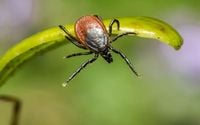As the warm weather sets in, residents of the Republic of Udmurtia are facing a concerning rise in tick bites. Since the beginning of 2025, a staggering 3,476 cases have been reported, according to the press service of the Rospotrebnadzor management for the region. The data indicates that the majority of these incidents occurred in natural settings, with 55% of bites happening in forests and forest parks, while 17% took place in summer cottages.
Ticks have also been found in other public areas, including places of leisure and cemeteries, raising alarms among local health officials. With the arrival of spring, the risk of tick bites has escalated, prompting health authorities to issue warnings and guidelines to the public.
Out of the 2,638 ticks tested in laboratories, a significant number were found to be carriers of various infectious diseases. Specifically, 17 ticks were infected with tick-borne viral encephalitis, 716 were positive for borreliosis, 26 carried anaplasmosis, and 100 were infected with ehrlichiosis. The presence of these pathogens has heightened concerns about public health safety.
Currently, only one confirmed case of borreliosis has been reported—a local resident from Votkinsk contracted the disease after being bitten by a tick. This case underscores the potential dangers associated with tick bites, prompting health officials to recommend preventive measures.
To minimize the risk of tick bites, residents are advised to take several precautions when venturing into green spaces. These include wearing light-colored, tightly woven clothing, applying insect repellent, and conducting regular checks for ticks on their bodies, particularly in areas such as behind the ears, under the arms, and around the waist. Health experts suggest that individuals should inspect themselves every 15 minutes when in high-risk areas.
In the unfortunate event of a tick bite, it is crucial to remove the tick as soon as possible. This can be done at local clinics during weekdays, while emergency departments at hospitals are available on weekends and holidays. If individuals must remove the tick themselves, they should wash their hands thoroughly afterward and treat the bite area with an alcohol-based antiseptic. The removed tick should be taken for laboratory testing to determine if it is a carrier of any diseases.
Health authorities have established several laboratory locations across Udmurtia for tick testing, including facilities in Izhevsk, Glazov, and Votkinsk. These labs operate on weekdays from 8:30 AM to 4:00 PM and on weekends from 9:00 AM to 2:00 PM.
For children under 18 years old who have not been vaccinated against tick-borne encephalitis, health officials offer anti-tick immunoglobulin free of charge within the first three days following a bite. This initiative aims to neutralize the virus and prevent the onset of illness. However, adults will need to pay for the immunoglobulin, which currently costs around 6,500 rubles for a package of ten ampoules in pharmacies across Izhevsk.
Doctors emphasize the importance of monitoring one's health for two to three weeks after a tick bite. Symptoms such as fever, headaches, or muscle pain should prompt individuals to seek immediate medical attention. This vigilance is essential for early detection and treatment of tick-borne diseases.
The surge in tick bites this year serves as a stark reminder for residents to remain vigilant as they enjoy the outdoors during the spring and summer months. With the right precautions, the risk of tick-borne illnesses can be significantly reduced, allowing everyone to enjoy nature safely.




